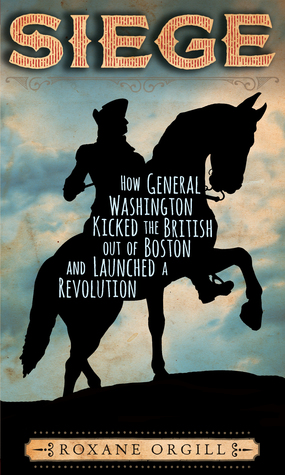WILD & WONDERFUL WEDNESDAY: Siege: How General Washington Kicked the British Out of Boston and Launched a Revolution
ABOUT THE BOOK
Step back to British-held Boston and hear the voices of citizens, militiamen, and redcoats at a turning of the tide in the American Revolution, brought to life in Roxane Orgill's deft verse.
It is the summer of 1775. The British occupy Boston and its busy harbor, holding residents captive and keeping a strong military foothold. The threat of smallpox looms, and the town is cut off, even from food supplies. Following the battles of Lexington and Concord, Congress unanimously elects George Washington commander in chief of the American armed forces, and he is sent to Cambridge, Massachusetts, to transform the ragtag collection of volunteer militiamen into America's first army. So far the war is nothing more than a series of intermittent skirmishes, but Washington is in constant fear of attack — until he takes the offensive with results that surprise everyone, the British most of all. Roxane Orgill uses verse to zoom in on the siege of Boston that launched the war to defeat the British, giving voice to privates and generals, their wives and city residents. to tell a story that is usually overlooked in Revolutionary War history. Back matter includes source notes, a glossary, and a bibliography.
REVIEW
I wasn't aware this book was written in free verse until I picked it up to read it. I've developed a fondness for free verse stories as I've become an adult. Sadly I'm not sure I would have picked this up as a kid. But it's a fabulous telling of one of the major events leading into the American Revolution. The siege of Boston was the prelude to the 'official' start of war between the patriots and the British and as such was an important series of events in moving the country towards independence.
One of the problems with writing history nonfiction for young readers is knowing how many details to include. If you don't include enough, the young reader doesn't get a good picture of events, but if you include too many details, the reader will get bogged down and lose interest. So the combination of free verse with it's limited word use with history makes for a great combination. But only if the writing is well done. And the writing here is very well done. The poems are short enough to be quick to read, but include enough information to be compelling. At least I found the writing compelling. The author also did a fabulous job balancing different aspects of the story. There are poems about Washington and the challenges he faced in pulling together untrained, poorly supplied, volunteer soldiers from across the area. There are poems about the orders given by Washington in an efforts to establish some discipline. There are poems about life in the camps (mostly boring with occasional events of interest). Poems about the British in Boston give a look at a city under siege. Henry Knox's remarkable trip to Fort Ticonderoga to obtain artillery for the fledgling army provide a glimpse into the challenges that the patriots faced.
Overall, Orgill has written a fascinating account of an important event in American history. This is a book that would be a great teaching tool in either history classes or Language Arts classes. The options are numerous here. But I think history-loving middle grade readers who pick this up will find much to enjoy as well.





Comments
Post a Comment